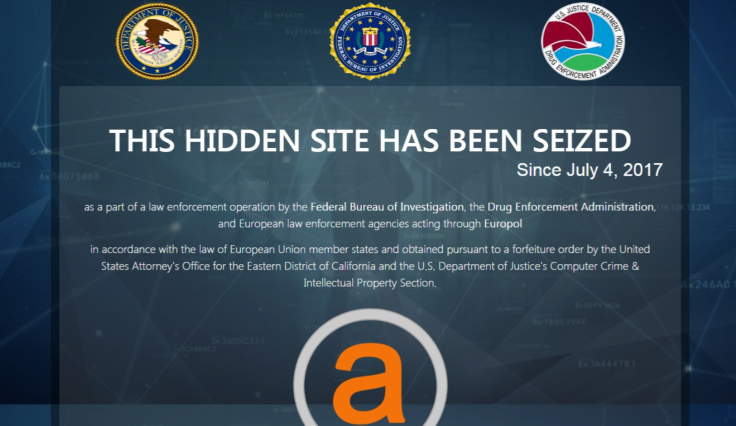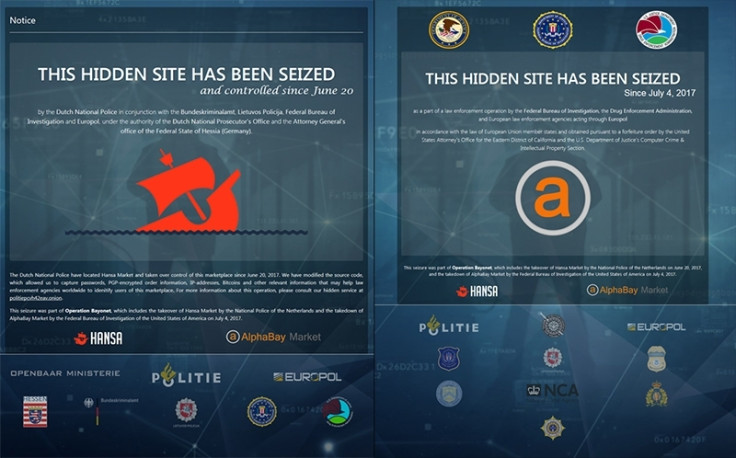AlphaBay and Hansa dark web markets shuttered in global cybercrime operation
The sites offered hundreds of thousands of illicit goods for sale, including Class A drugs.

A global law enforcement operation has resulted in the successful takedown of two of the largest underground marketplaces on the dark web, AlphaBay and Hansa. Millions of dollars' worth of cryptocurrencies were frozen and seized as a result of the action.
Spearheaded by the Federal Bureau of Investigation (FBI), the US Drug Enforcement Agency (DEA) and the Dutch National Police, with support from EU crime-fighting agency Europol, the much-anticipated announcement was officially made on 20 July 2017.
The two websites were reportedly responsible for the trading of over 350,000 illicit goods and services including drugs, firearms and computer malware.
Europol said in a statement the move was "one of the most sophisticated takedown operations ever seen."
AlphaBay was the largest criminal marketplace on the Dark Web, utilising a hidden service on the Tor network in a bid to mask user identities and server locations.
Prior to its takedown, AlphaBay reached more than 200,000 users and 40,000 vendors and, as of June 2017, there were approximately 369,000 listings for sale.
A conservative estimate of $1bn (£770m) was transacted in the market since its creation in 2014, authorities said. Transactions were paid in bitcoin and other cryptocurrencies. The other website, Hansa, which sold similar goods, was the third largest marketplace on the dark web.
Dutch Police was able to take over Hansa on 20 June 2017 under Dutch judicial authorisation, facilitating the covert monitoring of criminal activities on the platform until it was shut down today. Some 10,000 foreign addresses of Hansa market buyers have been passed on to Europol.
Investigators found the "market infrastructure" for Hansa was based in the Netherlands and Dutch police officiers were then able to locate and detain its two administrators, who remain unnamed at the time of writing. Servers were later seized in the Netherlands, Germany and Lithuania.
According to Europol, Dutch authorities had full control over Hansa since June.
Meanwhile, an FBI and DEA-led operation, codenamed "Bayonet", was able to identify the administrator of AlphaBay, a 25-year old Canadian citizen called Alexandre Cazes. On 5 July 2017, the suspect was arrested in Thailand and the site taken down. He later took his own life.
The DoJ said that Cazes and his wife had amassed numerous high value assets, including luxury vehicles, residences and even a hotel in Thailand. The suspect also possessed "millions of dollars" in cryptocurrency, which has now been seized by the FBI and the DEA.
An investigation conducted by the FBI and the US attorney's Office in the Northern District of Georgia identified an AlphaBay staffer living in the United States. That investigation is ongoing.
"This is an outstanding success by authorities in Europe and the US," Rob Wainwright, the executive director of Europol, said in a statement on 20 July.
"The capability of drug traffickers and other serious criminals around the world has taken a serious hit today after a highly sophisticated joint action in multiple countries.

"By acting together on a global basis the law enforcement community has sent a clear message that we have the means to identify criminality and strike back, even in areas of the dark web. There are more of these operations to come."
Referencing AlphaBay specifically, US attorney general Jeff Sessions, said: "This is likely one of the most important criminal investigations of the year – taking down the largest dark net marketplace in history.
"Make no mistake, the forces of law and justice face a new challenge from the criminals and transnational criminal organisations who think they can commit their crimes with impunity using the dark net. The dark net is not a place to hide."
You can read the full Department of Justice (DoJ) filing here.
© Copyright IBTimes 2024. All rights reserved.






